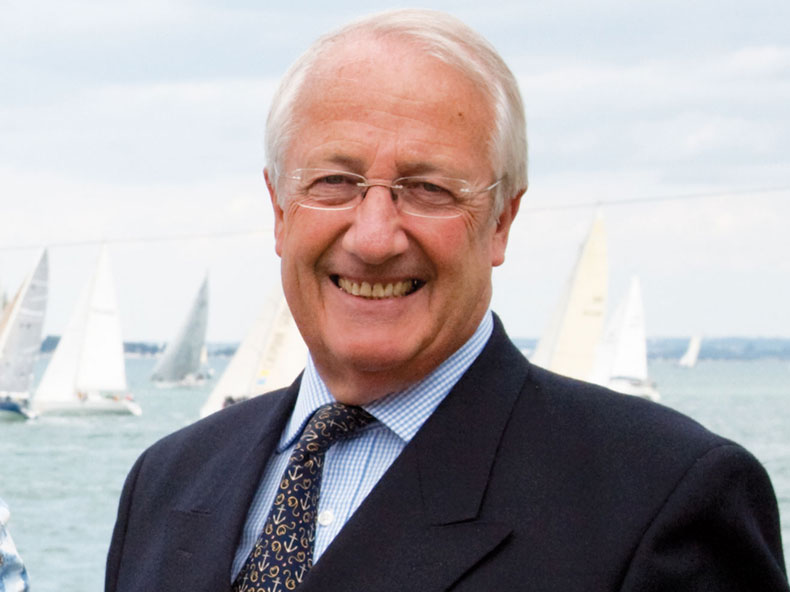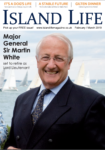 Major General Sir Martin White’s tenure as Lord Lieutenant of the Isle of Wight comes to an end on March 25. That is the day when he reaches his 75th birthday, and must retire the prestigious position, with former Island High Sheriff Susie Sheldon taking over as his successor.
Major General Sir Martin White’s tenure as Lord Lieutenant of the Isle of Wight comes to an end on March 25. That is the day when he reaches his 75th birthday, and must retire the prestigious position, with former Island High Sheriff Susie Sheldon taking over as his successor.
During the 13 years Sir Martin has been Lord Lieutenant, he has overseen more than 50 Royal visits to the Island, including all the senior members of the Royal Family. Other duties as The Queen’s representative on the Isle of Wight include encouraging nominations for the Queen’s Birthday and New Year’s Honours, and presenting British Empire Medals, and sometimes other awards such as MBEs.
In October last year, he became the recipient when he was invited to Windsor Castle for the ultimate accolade, to be knighted by Her Majesty the Queen.
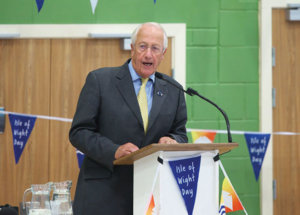 But his role of Lord Lieutenant, and for seven years prior to that in the position of Vice Lord Lieutenant, are just small but important parts of a remarkable life of the man who was born in Seaview, and attended Nettlestone Primary School, Ryde School and Sandown Grammar School, where he was always a keen sportsman.
But his role of Lord Lieutenant, and for seven years prior to that in the position of Vice Lord Lieutenant, are just small but important parts of a remarkable life of the man who was born in Seaview, and attended Nettlestone Primary School, Ryde School and Sandown Grammar School, where he was always a keen sportsman.
It was while he was at Sandown Grammar School, in Grove Road, that he joined the Army Cadets, and decided he would like to pursue a military career. It was a journey which took him through the ranks from Second Lieutenant to Major General, and playing a hugely important role in the suppression of Iraq dictator Saddam Hussein when his troops invaded Kuwait in the Second Gulf War.
Virtually everywhere Sir Martin travelled in the world, Fiona, his devoted wife since 1966, was at his side. The couple still live in Seaview, proud parents of four children and equally proud grandparents of 13.
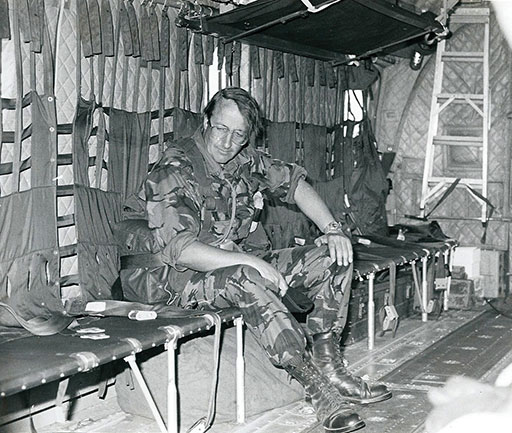 Sir Martin’s life in the British Army
Sir Martin’s life in the British Army
Sir Martin takes up the story of his military career and how it came about. He said: “While at Sandown Grammar School, one of my teachers was Dick Maybe, he ran the Sandown Cadet Unit at the old barracks, where the Heights Fitness Centre and Sandown Medical Centre now stand.
“He persuaded me to join the Cadets and until that point my aspiration when I left school was to become a farmer. But I absolutely loved the Cadets, polishing my boots and pressing my battle dress. We wore our uniforms with pride.”
That was when he decided an Army life should be his career path. He attended Welbeck College, a sixth form college in Nottinghamshire, which provided a course of A-Level education for candidates to the technical branches of the British Armed Forces. Completing the course and passing the necessary exams would lead to an automatic place at Sandhurst Military Academy.
“My careers’ master at Sandown wasn’t that much help, to be honest, but I spoke to my father, for whom I had a great deal of respect and admiration, and he said it was fine if that was what I wanted to do. Prior to my joining, we had no military connections in the family.”
Before going to Welbeck in September 1960, Sir Martin recalls how he went for a medical at Netley Military Hospital to see if he was fit for a military career, and it was only then that he learned he should be wearing spectacles. “Until the medical I just thought everyone’s eyesight was the same as mine, but in fact I was very short-sighted,” he smiled. “When I went to Welbeck, I never had any doubts whatsoever about whether I was doing the right thing.”
After two years at Welbeck, Sir Martin went to Sandhurst as an Officer Cadet. He said: “Sandhurst brings together a whole range of people from all walks of life, from all over the world and turns them into Second Lieutenants in two years.
“Those two years were essential to me because I matured and grew up. I couldn’t have commanded 40-odd soldiers when I started, but I could when I left. It gave me the confidence and knowledge to take my place in the Army.”
Sir Martin was then commissioned into the Royal Army Service Corps and was running transport for the army in Germany, supporting the fighting elements of the army by supplying them with ammunition, vehicle spares, food, equipment and so on – everything to support an army brigade.
He said: “This was right at the height of the Cold War, and the Berlin Wall was going up, and we had over 50,000 troops in Germany. In all, Fiona, who was also in the army, and I spent about 15 years in Germany in various appointments. We were married in 1966, and Fiona decided to leave the army, because I did not want to be posted in one place and her in another.”
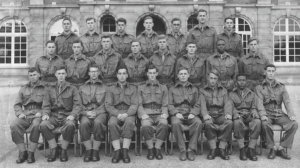 Sir Martin was promoted to Captain, and in the following years, amid numerous postings in this country and abroad, his army stature grew. He even had a staff job with the Military Defence in London, smiling: “Nobody in the Military Defence expects Captains to do anything, and I didn’t disappoint them. But I did learn a hell of a lot.”
Sir Martin was promoted to Captain, and in the following years, amid numerous postings in this country and abroad, his army stature grew. He even had a staff job with the Military Defence in London, smiling: “Nobody in the Military Defence expects Captains to do anything, and I didn’t disappoint them. But I did learn a hell of a lot.”
After passing his Staff College exams at Camberley, and being promoted to Major, Sir Martin and his young family spent two years in Cyprus, before he went to command a squadron of 200 in Germany, carrying specialist weapons and nuclear warheads around. He commanded the Logistic Support Group between 1987 and 1989.
A move to a staff job at the HQ of the First British Corps in Bielefeld, Germany, gave Sir Martin one of the jobs he liked most. He said: “I was a key major logistics staff planner, and I had a huge amount of responsibility. I worked with some real able people, I was ‘pink-listed’ to be promoted from Major to Lieutenant Colonel within the next year.”
Moves continued and responsibilities grew, with Sir Martin commanding regiments of close to 1,000 soldiers in three fighting brigades, running the transport operations; returning to the Staff College at Camberley as an instructor, and teaching operating logistics to young students to become Army Officers.
Promoted to Colonel, he worked with Danish Forces and NATO, commanding a logistic formation of 12,000 regular, mixed and territorial army soldiers to prevent Soviet and Polish incursions around Zealand and other Danish islands, as the Cold War continued, and the Berlin War still stood tall.
Sir Martin then experienced a ‘life-changing’ period as he became an integral part of the UK’s role in the Gulf War, commanding the Force Maintenance Area. He said: “In 1990 Saddam Hussein decided to invade Kuwait, and it was clear we were going to get involved. I had the experience and knowledge to put together a Force to support the First Armoured Division going into Kuwait.
“The US had already deployed and we went out on reconnaissance in August, 1990, then went back to Germany to put together the Force to provide all the logistical equipment – ammunition, fuel, rations etc. I didn’t really have any staff, and it was seriously manic. I had to pull in staff from elsewhere before we could deploy.”
Based in the port Jubail, Saudi Arabia, and waiting to support the counter-attack in Kuwait 80 kilometres away, Sir Martin and his troops often had scud missiles falling around them, although he said: “I never felt under any real threat. But sometimes when we drove along the Tap Line Road moving equipment, including 80 tons of ammunition nearer to Kuwait, you realised ‘just over there, if the Iraqis knew what we were doing, they would try to do something about it’. And they didn’t know what we would do to them.
“It was a moment in my life when I thought ‘what’s this all about’. But if you go into the Army you expect to go on operations you are professionally trained for. So this was a special feeling in my life. It was high pressure, but I wouldn’t have missed it for the world.”
Following the six-week Gulf ‘Air War’, the ‘Ground War’ against Iraq lasted just 100 hours. A total of 147 British ships were in the area, supporting troops with all types of equipment and supplies, and the Logistics Corps, under Sir Martin’s command, unloaded it all and transported it to the key areas.
After Margaret Thatcher’s reign as Prime Minister ended, her successor John Major travelled to Saudi to speak to troops. With Sir Martin present, Mr. Major was handed a note addressed to ‘The Prime Minister’ from a chef which read “I know you’re a Chelsea supporter, what can we do about life at Stamford Bridge?” The Prime Minister asked the senior officers ‘anything else going on?’ and then wrote the chef a reply!
With the combined forces of Britain, the US, Arab Coalition Forces, France, and support in kind from other countries, the Gulf War was won. But the British Forces suffered 47 casualties, with all the coffins returned to this country on one flight. Sir Martin recalls: “It was a very emotional experience just watching the coffins leave, and one I will never forget.”
He returned home in March, 1991, having been promoted to Brigadier just before the war began, and during the conflict was the third-ranked British Officer in the Gulf. He said: “While there it was like being in a bubble, but difficult to describe. I didn’t see Fiona, because I was in that bubble, I was doing a job, and I had no other focus. Of course I missed my family, and I was apprehensive about what might or might not happen.
“But you deal with that. It was an amazing experience – life changing really -because you are never quite the same again. There had been a clear breach of international rule of law, with Hussein having invaded a Sovereign nation. Most people said he had to be thrown out, so there was a general support of what we were doing, and it was fabulous to be part of it.”
Sir Martin remained in the Army until 1998, taking further high profile roles in this country and Germany, including Head of the Royal Logistics Corps, incorporating 14,000 regular soldiers and 20,000 TA members. He was ultimately promoted to Major General, before leaving the military to take up a position with Ernst & Young a multinational professional services firm.
Life as the Lord Lieutenant of the Isle of Wight
Sir Martin succeeded Christopher Bland as the Isle of Wight’s Lord Lieutenant in 2006, having been Deputy and then Vice Lord Lieutenant for seven years.
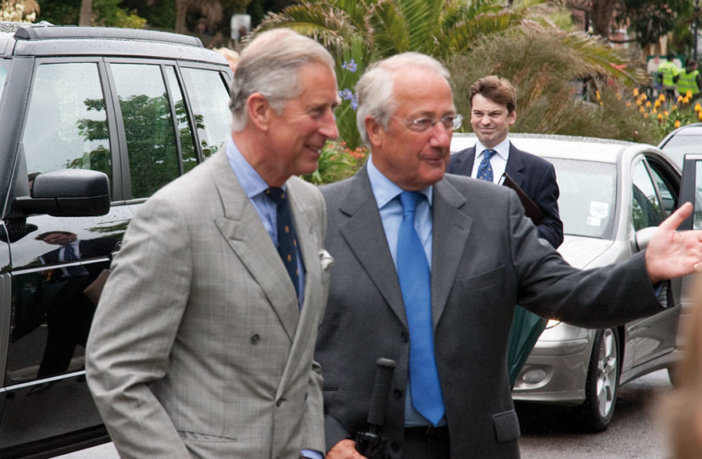 He is one of 98 Lord Lieutenants nationwide, with the office dating from Tudor times when Lord-Lieutenants were first appointed to a number of English historic counties by Henry VIII to control the increasing power of High Sheriffs.
He is one of 98 Lord Lieutenants nationwide, with the office dating from Tudor times when Lord-Lieutenants were first appointed to a number of English historic counties by Henry VIII to control the increasing power of High Sheriffs.
He recalls: “The Cabinet Office rang me one day and said they proposed to put my name forward to The Queen to become the Lord Lieutenant of the Isle of Wight, and I had 24 hours to think about it.
“Of course it is a huge honour and privilege; of course I would love to do it, but I had my wife Fiona, four children and 13 grandchildren, plus I have a range of other interests to consider.”
However, he has managed to combine all the privileges and the potential pitfalls with military precision, to emerge a highly-respected, popular and successful Lord Lieutenant, who will be missed by many after his retirement, even though Susie Sheldon is the perfect successor.
Sir Martin has many happy memories, especially the visit of the Queen as part of her Diamond Jubilee celebrations. He said: “I think that visit in 2012 has to be the stand-out one, to have Her Majesty here as part of her celebrations. It was a busy schedule, but I think it ran smoothly, and parts were extremely amusing.
“That occasion is closely followed by the 2015 bi-centenary of the Royal Yacht Squadron, because of the number of Royal families on the Island on one day. There were 13 members of European Royal Families altogether, arriving and departing at different times. It was a challenge, but it worked.
“They included the Duke of Edinburgh, Princess Royal, Earl and Countess of Wessex, Prince Michael, and from abroad, King Harold of Norway, the Crown Prince of Denmark, the Aga Khan, King Juan Carlos, the former King of Spain, and King Constantine of Greece. That was certainly my busiest day for Royal visits.”
That event also brought Sir Martin one of the most amusing moments of his tenure. He said: “A member of my staff was checking people into Holy Trinity Church, Cowes for the evening service as part of the celebrations. She was sitting there, and said to one person ‘can I have your name please sir?’
“The reply was ‘Harold’ and when my staff member asked ‘Harold what?’ the answer was ‘King Harold of Norway’! It took the lady several weeks to admit to me she said it, and I replied: “Don’t worry, it won’t go beyond me, I won’t tell anybody.
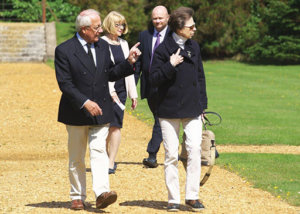 “The Island still benefits from a legacy of the bi-centenary, because as as result of it the Royal Yacht Squadron Foundation was set up, which has subsequently helped some 55 youngsters to do various work in the marine industry.”
“The Island still benefits from a legacy of the bi-centenary, because as as result of it the Royal Yacht Squadron Foundation was set up, which has subsequently helped some 55 youngsters to do various work in the marine industry.”
Back to the lighter moments, and on another occasion, when the Duke of Edinburgh made another visit to the Island, chef Robert Thompson put together a bag of goodies. Sir Martin said: “It included some elephant garlic from the Garlic Farm. When the Duke was shown the elephant garlic, he said ‘I didn’t know we had any elephants on the Isle of Wight’.”
Looking back on his time as Lord Lieutenant, Sir Martin says: “I have met a huge cross-section on the Isle of Wight, and there are some truly wonderful people here. Obviously there are some who have their moans about certain things, but for me there are far more pluses than minuses.
“We have a lot to be proud of, and I think the important thing about my role has been to make sure people who visit us see that, understand it and give us credit for it. We still have our challenges, but things continue to get better.
“I hope I’ve done my duty by this community, and there is nothing I can say ‘I wish I had done that’. There are things that haven’t quite worked out as I would have wanted, but they have probably worked out for the better anyway. I think I can say it has been a job reasonably well done.
“It has been a huge privilege, and I have enjoyed 99.9 per cent of it. I am not particularly sorry it is coming to an end, because as one door closes another one opens. Fiona and I have lots of things we still want to do, including hopefully seeing more of our 13 grandchildren.
“I am also going to keep chickens, something I have always wanted to do. But the one thing I will never forget is being knighted by Her Majesty at Windsor Castle in November. It was a wonderful occasion, as I didn’t think Her Majesty did many ceremonies these days. But when I saw the Royal Standard flag flying over Windsor Castle, I knew she was there, and it was just a fabulous occasion. To be knighted by your Sovereign has to be the pinnacle for anyone – it was for me.”



